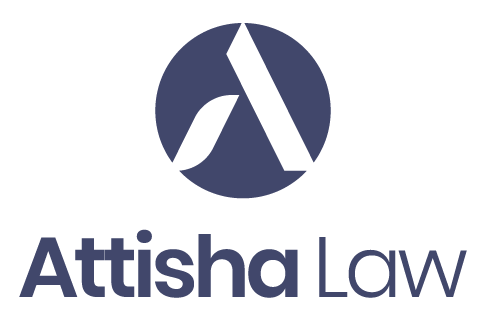Business Transactions and Litigation

Business Transactions and Business Litigation
Ashley understands the dedication and perseverance required to cultivate a thriving business. She recognizes that every business journey embarks with a visionary idea and has the potential to evolve into a flourishing venture, offering not just financial rewards but also less working hours and more freedom.
Drawing from her personal understanding of the challenges faced by small business owners, Ashley Attisha is committed to ensuring that your business endeavors are built on a solid legal foundation. Business owners understand the importance of precision in contracts and transactions, as they form the bedrock of building a business.
At Attisha Law, we collaborate with clients to craft meticulous operating agreements, independent contractor agreements, and employment agreements that reflect the unique needs and aspirations of your business. From the inception of your business idea to the execution of marketing strategies, budgeting, and development plans, our legal expertise becomes an invaluable asset at every juncture. Ashley works as both an attorney and partner in your journey offering advice and guidance to navigate the complexities of entrepreneurship.
Whether you are a budding entrepreneur or a seasoned business owner seeking to expand your operations, Attisha Law is here to provide the legal support you need. Trust us to be the legal backbone of your business, allowing you to focus on what you do best – steering your enterprise towards growth, success, and lasting prosperity.
What Our Clients Say
Areas We Serve
Attisha Law is proud to serve Oakland, Wayne and Macomb counties in Southeast Michigan. Whether near or far from our Detroit office, we will accommodate you to meet virtually or in person.
We have served clients from the following cities:
- Bloomfield Hills
- Greater West Bloomfield
- Grand Rapids
- Detroit
- Farmington Hills
- Southfield
- Sterling Heights
- Troy
- Warren
New Client Form
Please fill out the form below to get in touch with our office. This form will help us prepare for our discussion with you about your case.
Contact Us
We will get back to you as soon as possible.
Please try again later.
Frequently Asked Questions
-
What are the key components of standard employment contracts?
Employment contracts are legally binding agreements that outline the terms and conditions of the working relationship between employers and employees in Michigan. This summary provides an overview of employment contracts according to Michigan law, including their key components, types, and enforceability.
Key Components
Exploring the essential elements typically found in employment contracts, such as job duties, compensation, benefits, working hours, and termination provisions.
Types of Employment Contracts
Discussing the various types of employment contracts, including at-will employment, fixed-term contracts, and implied contracts.
Enforceability
Examining the factors that affect the enforceability of employment contracts in Michigan, such as mutual consent, consideration, and compliance with state and federal employment laws.
Negotiation and Drafting
Discussing the importance of negotiation and careful drafting of employment contracts to ensure that the terms are fair, reasonable, and mutually beneficial to both parties
Restrictive Covenants
Exploring the inclusion of restrictive covenants, such as non-compete and non-disclosure clauses, in employment contracts and their enforceability under Michigan law.
Breach of Contract
Addressing the potential consequences of breaching an employment contract, both for employers and employees, and the legal remedies available to parties affected by the breach.
Amendments and Termination
Examining the procedures for amending employment contracts and the circumstances under which contracts may be terminated, either by mutual agreement or due to other lawful reasons.
Employment contracts form the foundation of the employer-employee relationship in Michigan. By considering key components, types, enforceability, negotiation, restrictive covenants, breach of contract, and termination, employers and employees can create and maintain a transparent and legally compliant working environment.
-
What defines independent contractors?
An independent contractor is an individual or business that provides services to another entity under the terms of a contract. Unlike employees, independent contractors maintain a higher degree of control over how they perform their work and manage their schedules.
In Michigan, the classification of workers as independent contractors or employees is not solely determined by the worker's preference or the employer's label. Instead, the state follows a multi-factor test that considers various elements to determine the nature of the working relationship. Some of the factors examined include:
1. Control: The degree of control the employer has over the worker's tasks, schedule, and methods of completing the work.
2. Independence: Whether the worker operates an independent business distinct from the hiring entity.
3. Integration: The extent to which the worker's services are integral to the core business of the hiring entity.
4. Investment: Whether the worker has made significant investments in equipment, tools, or facilities to carry out the work.
5. Payment Method: How the worker is compensated, such as receiving a fixed fee per project rather than a regular salary.
Legal Ramifications
Correctly classifying workers is vital as it affects both parties' legal rights and obligations. Independent contractors are not entitled to employee benefits such as workers' compensation, unemployment insurance, and health insurance. They are responsible for paying their own taxes, including self-employment taxes.
On the other hand, misclassifying employees as independent contractors can lead to legal consequences for employers. Employers may be liable for unpaid taxes, fines, and other penalties. Therefore, it's crucial for businesses to carefully assess their working relationships to ensure compliance with Michigan's independent contractor laws.
The presumption is that a worker is an employee unless the employer can demonstrate all three of the following:
1. The worker is free from the control and direction of the hiring entity in connection with the performance of the work.
2. The worker performs work that is outside the usual course of the hiring entity's business.
3. The worker is customarily engaged in an independently established trade, occupation, profession, or business of the same nature as the work performed.
-
What specific limitations do non-compete agreements impose?
Non-compete employment agreements in Michigan are contracts between employers and employees that restrict the employee's ability to work for a competitor or start a competing business after leaving their current job.
Enforceability
Non-compete agreements are generally enforceable in Michigan, but they must meet certain criteria to be valid. They must be reasonable in duration, geographic scope, and the nature of the restriction to protect the employer's legitimate business interests.
Duration and Geographic Scope
The non-compete agreement must specify a reasonable time frame during which the employee is restricted from competing with the employer. The geographic scope should be limited to areas where the employer has a legitimate interest in protecting their business.
Legitimate Business Interests
To be enforceable, the non-compete agreement must be designed to protect the employer's legitimate business interests, such as trade secrets, confidential information, customer relationships, or specialized training.
Consideration
Non-compete agreements must be supported by adequate consideration, such as offering employment to the employee at the beginning of the employment relationship or providing additional compensation or benefits during employment.
Exemptions
Certain professions, such as physicians, attorneys, and broadcasters, have exemptions that limit the enforceability of non-compete agreements in Michigan.
Court Discretion
Courts have the discretion to modify or strike down non-compete agreements that are deemed unreasonable, overly restrictive, or against public policy.
Blue Pencil Rule
Michigan follows the "blue pencil" rule, which allows courts to modify overly broad non-compete agreements to make them enforceable, rather than declaring the entire agreement void.
Employers and employees should be aware of Michigan's specific laws regarding non-compete agreements. Legal advice from an employment attorney can help ensure that non-compete agreements are drafted in compliance with Michigan law and protect the interests of both parties.
-
Does my business need an operating agreement?
Operating agreements play a crucial role in the functioning and governance of limited liability companies (LLCs) in Michigan. This summary provides an overview of operating agreements according to Michigan law, highlighting their significance, key provisions, and benefits for LLC owners.
Definition and Purpose
An operating agreement is a legal document that outlines the internal structure, management, and ownership of an LLC. It serves as a contract between LLC members, establishing the rules and procedures for running the business.
Key Provisions
Operating agreements typically address important aspects such as the division of profits and losses, voting rights, member contributions, management responsibilities, and dispute resolution methods.
Flexibility and Customization
Michigan law allows LLC owners significant flexibility in crafting operating agreements to suit the specific needs and goals of their business.
Protection and Clarity
Operating agreements provide clarity on the rights and obligations of LLC members, helping prevent disputes and offering legal protection in case of disagreements or legal challenges.
Formation and Legal Requirements
Michigan law does not mandate that LLCs have a written operating agreement, but having one is highly recommended. Exploring the process of creating an operating agreement and ensuring it complies with the state's legal requirements.
Member Roles and Responsibilities
Operating agreements define the roles and responsibilities of LLC members, specifying their contributions to the business, decision-making authority, and participation in day-to-day operations.
Admission and Withdrawal of Members
Operating agreements outline the procedures for admitting new members into the LLC and the process for a member's withdrawal or dissociation from the company.
Dissolution and Termination
Addressing how the LLC will be dissolved or terminated, including the distribution of assets and liabilities, in the event the business is closed.
Operating agreements serve as valuable tools for LLCs in Michigan, providing a framework for organizing and governing the business. By addressing key aspects of LLC management, membership, and decision-making, these agreements promote a harmonious and
well-structured business environment for all members involved.
-
What is the process of debt collection and how does it work?
Debt collection refers to the process by which a creditor or a debt collection agency seeks to recover outstanding debts from individuals or businesses who have failed to fulfill their financial obligations.
Creditor's Rights:
Creditors have the legal right to collect debts owed to them. This includes unpaid loans, credit card balances, medical bills, or other outstanding obligations. They may attempt to collect the debt themselves or hire a third-party debt collector.
Fair Debt Collection Practices Act (FDCPA):
In the United States, debt collection activities are regulated by the Fair Debt Collection Practices Act. This federal law sets guidelines and restrictions on how debt collectors can interact with debtors, prohibiting abusive, deceptive, or unfair practices.
Debt Validation:
Debtors have the right to request validation of the debt, which requires the creditor or debt collector to provide proof of the debt's existence and the debtor's liability. This ensures that debtors have accurate information and can dispute the debt if necessary.
Notice and Communication:
Debt collectors must provide written notice to the debtor, informing them of the debt and their right to dispute it. They should provide clear and accurate information regarding the debt amount, the creditor, and the options available to resolve the debt.
Debt Repayment:
Debtors may negotiate repayment plans with the creditor or debt collector to settle the outstanding debt. These agreements can include reduced payments, extended payment terms, or other arrangements to satisfy the debt.
Legal Remedies:
If a debtor fails to cooperate or make payments, creditors may pursue legal action. This can result in a lawsuit, where the court may issue judgments allowing the creditor to collect the debt through wage garnishment, bank account seizure, or other legally authorized means.
It is important for both creditors and debtors to understand their rights and obligations under the applicable laws and regulations related to debt collection. Seeking legal advice can be helpful to navigate the complexities of debt collection and ensure compliance with relevant legal requirements.
-
What is typically established in a partnership?
Partnerships are a common business structure in Michigan, where two or more individuals come together to carry on a business for profit. This summary provides an overview of partnerships according to Michigan law, including their types, formation, management, liability, and tax treatment.
Types of Partnerships
Exploring the different types of partnerships recognized in Michigan, including general partnerships, limited partnerships, and limited liability partnerships (LLPs).
Formation
Discussing the process of forming a partnership in Michigan, including the importance of a written partnership agreement and necessary filings with the state.
Management
Highlighting the roles and responsibilities of partners in managing the partnership, and the potential differences in management structures between general partnerships and limited partnerships.
Liability
Examining the liability implications for partners in different types of partnerships, and how personal assets may be at risk for debts and obligations incurred by the business.
Tax Treatment
Discussing the tax treatment of partnerships in Michigan, where profits and losses are typically passed through to the individual partners' tax returns.
Partnerships offer business owners in Michigan an option to collaborate and share responsibilities. Understanding the various types of partnerships, their formation, management, liability, and tax treatment allows partners to make informed decisions and establish successful business ventures in the state.
-
What is a limited liability company?
A limited liability company (LLC) is a popular business structure in Michigan, offering flexibility, liability protection, and tax benefits. This summary provides an overview of LLCs according to Michigan laws, including their formation, management, liability protection, and tax treatment.
Formation
Exploring the process of forming an LLC in Michigan, including selecting a unique business name, filing articles of organization, and designating a registered agent.
Management
Discussing the management structure of an LLC in Michigan, which can be member-managed or manager-managed, and the roles and responsibilities of LLC members and managers.
Liability Protection
Highlighting the limited liability protection that LLC members enjoy, which shields their personal assets from business debts and liabilities.
Tax Treatment
Examining the tax flexibility of LLCs in Michigan, which allows them to choose their tax classification as either a pass-through entity or a corporation.
Operating Agreement
Exploring the significance of an operating agreement for LLCs in Michigan. This internal document outlines the company's internal workings, including ownership percentages, profit distribution, voting rights, and management procedures.
Annual Reporting and Compliance
Discussing the annual reporting requirements and other compliance obligations that LLCs in Michigan must fulfill to maintain their active status with the state.
Michigan's laws on limited liability companies offer entrepreneurs a flexible and advantageous business structure. By understanding the formation process, management options, liability protection, tax treatment, operating agreements, and compliance requirements, individuals can make informed decisions when establishing and managing their LLCs, fostering a solid foundation for their business endeavors.



